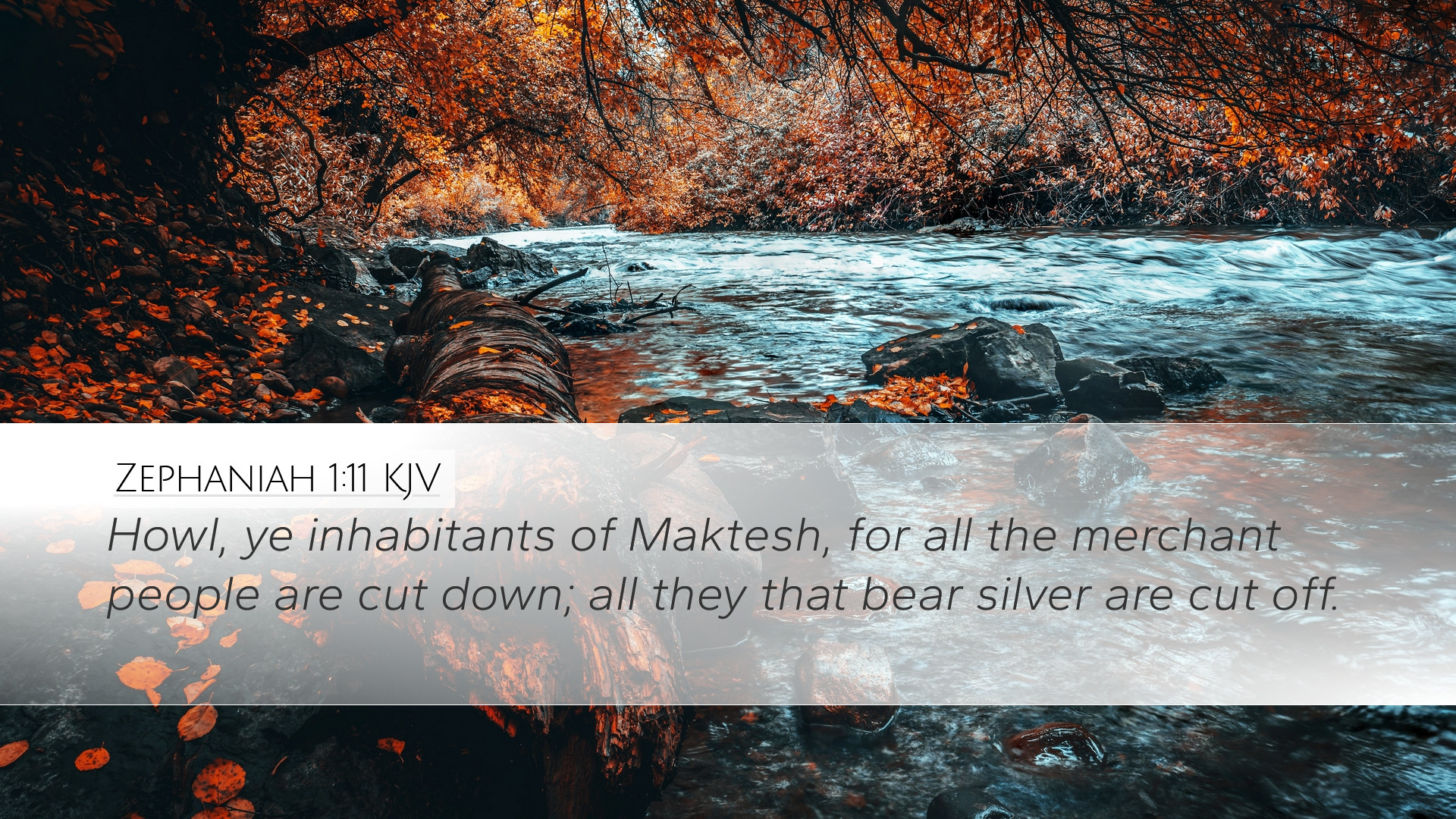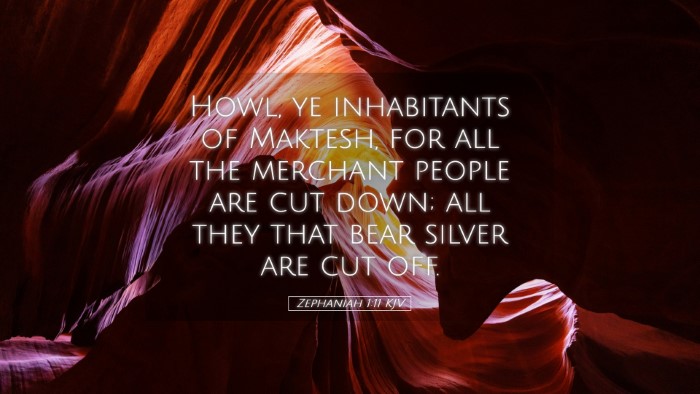Old Testament
Genesis Exodus Leviticus Numbers Deuteronomy Joshua Judges Ruth 1 Samuel 2 Samuel 1 Kings 2 Kings 1 Chronicles 2 Chronicles Ezra Nehemiah Esther Job Psalms Proverbs Ecclesiastes Song of Solomon Isaiah Jeremiah Lamentations Ezekiel Daniel Hosea Joel Amos Obadiah Jonah Micah Nahum Habakkuk Zephaniah Haggai Zechariah MalachiZephaniah 1:11
Zephaniah 1:11 KJV
Howl, ye inhabitants of Maktesh, for all the merchant people are cut down; all they that bear silver are cut off.
Zephaniah 1:11 Bible Commentary
Commentary on Zephaniah 1:11
Verse Context: Zephaniah 1:11 reads, "Howl, ye inhabitants of Maktesh, for all the merchant people are cut down; all they that bear silver are cut off."
Introduction
This verse captures the essence of divine judgment upon the inhabitants of Jerusalem, particularly targeting the merchant class. The prophet Zephaniah consistently warns of the impending doom that awaits those who engage in practices contrary to God's will. Various public domain commentaries provide insight into the significance of this prophecy, its historical context, and its theological implications.
Historical and Cultural Context
Maktesh is believed to refer to a valley or a marketplace in Jerusalem, a vital center for trade and commerce. The inhabitants of this area relied heavily on their mercantile activities for their livelihood. The judgment proclaimed here signifies a stark warning that the economic stability built upon ethical immorality and injustice is about to crumble.
Insights from Commentaries
-
Matthew Henry:
Henry emphasizes the desolation of social commerce and the associated grief among the inhabitants. He interprets the "howl" as a profound expression of lamentation, indicative of the loss of not just wealth but also the social fabric that commercial activities fostered. His commentary highlights the futility of placing trust in material wealth rather than in God.
-
Albert Barnes:
Barnes elaborates on the phrase "merchant people" and suggests that the merchants symbolize those who amass riches through dishonest means. He points out that financial gain detached from morality invites divine judgment. The cutting off of these merchants serves as a metaphor for impending disaster, where prosperity rooted in wickedness is unsustainable.
-
Adam Clarke:
Clarke comments on the socio-economic ramifications of the prophecy. He notes that the people of Maktesh were likely confounded by their sudden downfall. Clarke further suggests that the lamentation is not only for lost wealth but also for the realization of their moral decay that has now led to their downfall.
Theological Implications
The judgment rendered upon the inhabitants of Maktesh transcends mere admonishment; it embodies a broader theme of divine justice that resonates throughout scripture. The lamentation reflects a deep sorrow for those who have lost their way, emphasizing God's desire for repentance.
God’s Sovereignty and Justice
Both Henry and Barnes convey a strong sense of God's righteousness interwoven in His governance. The destruction of Maktesh illustrates that no societal group is immune to divine judgment; rather, it showcases God’s omnipotence over all aspects of life, including economic systems.
Human Reliance on Wealth
This verse serves as a critical reflection for contemporary believers, challenging the autonomy placed on financial security. Clarke’s insights remind readers of the transient nature of material wealth—a theme notably present in the New Testament, where Jesus speaks of storing treasures in heaven.
Practical Applications
Pastors and theologians can draw substantial lessons from Zephaniah 1:11, framing their messages around the call for integrity in business practices and societal engagement. The God who judges the merchants demands honesty and righteousness from His people.
Integrity in Commerce
- Encourage the congregation to engage in ethical business practices.
- Promote accountability within marketplaces to foster a culture of fairness.
Hope in Repentance
Though the message is somber, it also carries an underlying hope. The call to howling showcases the need for repentance—a turning from evil back to God. Pastoral leadership can emphasize that there is always an opportunity for restoration, regardless of how far one has strayed.
Conclusion
Zephaniah 1:11 serves as a poignant reminder of the divine principles governing societal conduct and the consequences of unethical behavior. The combined insights from Henry, Barnes, and Clarke underscore a timeless truth of faithfulness in all aspects of life, ensuring that believers remain vigilant and anchored in righteousness.


